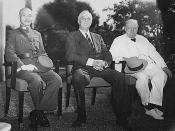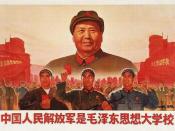Witnesses and Historians
Chu Wang
Professor Lipman
04/27/10
Witnesses and Historians
Witnesses and historians are the two distinctive groups of people in recording important historical moments. Witnesses observe history by living through it. Historians observe history by gathering and analyzing witnesses' accounts. Yet the major difference between witnesses and historians is the knowledge of what happened afterwards. Historians know more about the aftermath, and this awareness changes their view of what went before. Witnesses, on contrary, have a comparative advantage here: at a given historical moment, they do not know about the future. Thus their account seems less meticulous or anticipated but more natural and realistic.
Acknowledging the difference between witnesses and historians is crucial in analyzing the books written by Yu Hua and Spence. To Live, written by Yu Hua, is a fiction based on near real historical models in 20th century China. Although fictional, the story strikes readers deeply.
When reading the story, readers share the sense of worrying the future with the witness, Fu Gui. The unawareness and fear, contrast to historians whose accounts are well structured according to the order of results and consequences, bring readers unexpected resonance in understanding humanity. The chaos, confusion, paradox, perplexity and dark humor that rose up in Fu Gui's life is portrayed by a collective account of many Chinese witnesses during the second half of 20th century. These vivid experiences allow readers to relate to the characters. Every witness who went through this particular historical period shared memories and feelings with Fu Gui. The novel contains an unexpected first-hand account textbooks can not provide. Comparatively, the textbook written by Spence rarely achieves such resonance. At such expense, Spence avoids the partiality and bias in various accounts of witnesses, and constructs a history with order and reason.
The amazing...


